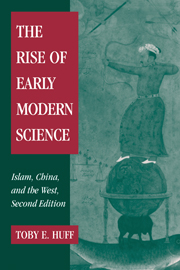Book contents
- Frontmatter
- Dedication
- Contents
- List of illustrations
- Preface to the second edition
- Preface to the first edition
- Acknowledgments
- Introduction
- 1 The comparative study of science
- 2 Arabic science and the Islamic world
- 3 Reason and rationality in Islam and the West
- 4 The European legal revolution
- 5 Madrasas, universities, and science
- 6 Cultural climates and the ethos of science
- 7 Science and civilization in China
- 8 Science and social organization in China
- 9 The rise of early modern science
- Epilogue: educational reform and attitudes toward science in the Muslim world and China since the eighteenth century
- Selected bibliography
- Index
9 - The rise of early modern science
Published online by Cambridge University Press: 05 June 2016
- Frontmatter
- Dedication
- Contents
- List of illustrations
- Preface to the second edition
- Preface to the first edition
- Acknowledgments
- Introduction
- 1 The comparative study of science
- 2 Arabic science and the Islamic world
- 3 Reason and rationality in Islam and the West
- 4 The European legal revolution
- 5 Madrasas, universities, and science
- 6 Cultural climates and the ethos of science
- 7 Science and civilization in China
- 8 Science and social organization in China
- 9 The rise of early modern science
- Epilogue: educational reform and attitudes toward science in the Muslim world and China since the eighteenth century
- Selected bibliography
- Index
Summary
Viewed from a comparative and civilizational point of view, the rise of modern science appears quite different than it does when seen exclusively as an intra-European movement. In the first instance, we realize that dedicated investigators of the processes of nature existed in other societies and civilizations around the globe. Over the course of time learned scholars exerted their utmost to fashion the technical tools and the explanatory devices needed to accomplish the task of mapping out and explaining all the realms of nature. What is perhaps most surprising is the fact that Arabic-Islamic culture and civilization had the most advanced science to be found in the world prior to the thirteenth and fourteenth centuries. In optics, astronomy, the mathematical disciplines of geometry and trigonometry, and medicine, its accomplishments outshone those of the West as well as China. We also know that men of science in the Islamic world wrote treatises on experimental science (in optics, medicine, and astronomy) and that they applied these techniques to specific areas of inquiry, especially optics. Here one thinks of the research program designed to explain the rainbow and the controlled experiments performed to achieve that end. In addition, in the realm of experiment, one thinks also of efforts in medicine and pharmacology.
It must be said, however, that these scientific activities were often scattered geographically, isolated in their influence, and conducted in semi-secrecy. The transmission of important correspondence and scientific treatises between investigators in distant places was often long delayed, incomplete, or even completely interrupted by local events and political upheavals. Still, the work went forward, and, over the course of time, indispensable elements of scientific practice accumulated and became a unique heritage of human endeavor.
If one takes the view of historians of science such as Edward Rosen, Herbert Butterfield, and notable others, the Copernican revolution was a major transformation in the Western conception of the universe and the individual's place in it. So viewed, the scientific revolution of the sixteenth and seventeenth centuries was a profound metaphysical revolution.
- Type
- Chapter
- Information
- The Rise of Early Modern ScienceIslam, China and the West, pp. 325 - 361Publisher: Cambridge University PressPrint publication year: 2003
- 1
- Cited by



